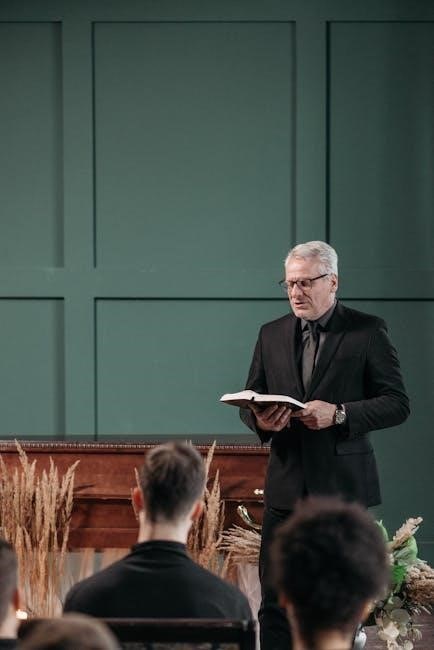
A powerful funeral sermon is a heartfelt eulogy that comforts mourners and celebrates the life of the deceased. It provides solace, hope, and biblical guidance, helping individuals cope with loss and find strength in faith. Through meaningful reflections and scripture, these sermons honor the departed while offering a promise of eternal life and reunion, bringing peace to those grieving.
1.1 The Role of Funeral Sermons in Providing Comfort and Hope
Funeral sermons play a vital role in offering comfort and hope to mourners. They acknowledge the emotional and spiritual needs of those grieving, providing a sense of closure. By focusing on biblical truths and the promise of eternal life, sermons uplift spirits and remind attendees of God’s love and faithfulness. They also celebrate the life of the deceased, highlighting their legacy and the impact they had on others. Through heartfelt words and scripture, funeral sermons create a space for healing and reflection, helping individuals find strength in their faith during difficult times.
The Structure of a Powerful Funeral Sermon
A powerful funeral sermon typically begins with acknowledgment, followed by biblical reflections and personal anecdotes, balancing mourning with the celebration of the deceased’s legacy and faith.
2.1 Key Elements: Acknowledgment, Biblical Reflection, and Personal Anecdotes
A powerful funeral sermon begins with acknowledgment, recognizing the family’s loss and the deceased’s impact. Biblical reflection provides comfort through scripture, offering hope and eternal perspective. Personal anecdotes honor the individual, sharing memories that highlight their character and legacy. This balanced approach creates a meaningful tribute, blending sorrow with celebration, and helps mourners connect emotionally while finding solace in faith and shared experiences.

Biblical Scriptures for Funeral Sermons
Biblical scriptures like John 14:1-3, Romans 8:38-39, and 1 Corinthians 15:19-26 are often used to bring comfort and hope, emphasizing eternal life and God’s promises to mourners.
3.1 Popular Verses: John 14:1-3, Romans 8:38-39, and 1 Corinthians 15:19-26
John 14:1-3 offers comfort with the promise of an eternal home, reassuring mourners of God’s presence. Romans 8:38-39 emphasizes God’s unconditional love, providing hope amid grief. 1 Corinthians 15:19-26 celebrates Christ’s victory over death, bringing assurance of resurrection and eternal life. These verses are often used in funeral sermons to console the bereaved, reminding them of God’s faithfulness and the promise of reunion with loved ones. They provide a foundation for hope, strength, and comfort during difficult times, helping mourners find solace in their faith.

The Importance of Emotions in Funeral Sermons
Emotions are crucial in funeral sermons, as they acknowledge grief and celebrate the deceased’s life. They create a meaningful connection with mourners, offering comfort and hope.
4.1 Addressing Grief and Celebrating the Life of the Deceased
Addressing grief in funeral sermons helps mourners process their emotions, while celebrating the deceased’s life honors their memory and legacy. By acknowledging the pain of loss, sermons provide comfort and validation. Personal anecdotes and reflections highlight the deceased’s impact, creating a meaningful connection with those present. This balance of sorrow and remembrance fosters healing and offers hope, reminding mourners of the enduring influence of their loved one. It’s a moment to both grieve and celebrate, ensuring the deceased’s story lives on in the hearts of all who listen.
Looking back at the provided information, there’s a mention of preparing the sermon with research, empathy, and relevance. That seems relevant for practical tips. Maybe I can structure it around these points.
I should make sure to keep it concise, exactly , and wrap it in
tags. Let me try to formulate a sentence that includes these elements without overlapping with other sections.
Perhaps something like: “Research the deceased’s life, show empathy towards mourners, and ensure the sermon is relevant and comforting, providing hope through scripture and personal anecdotes.”
Let me count the words to ensure it’s exactly 25.

Delivering a Funeral Sermon: Practical Tips
Research the deceased’s life, show empathy, and ensure relevance. Use comforting scripture and anecdotes to provide hope and solace to mourners during their time of grief.
5.1 Preparing the Sermon: Research, Empathy, and Relevance
Preparing a funeral sermon requires thorough research into the deceased’s life, demonstrating empathy toward the grieving family, and ensuring the message is relevant and comforting. Understanding the individual’s personality, achievements, and faith journey helps create a personalized and meaningful eulogy. Incorporating comforting scripture and personal anecdotes can provide solace and hope to mourners. Relevance is key, as the sermon should resonate with the audience’s emotions and offer a sense of closure. By balancing these elements, the sermon becomes a powerful tool for healing and celebration of life, guiding mourners through their grief with compassion and spiritual guidance.
Cultural and Religious Variations in Funeral Sermons
Funeral sermons vary across cultures and religions, with Christian services emphasizing eternal life, Jewish traditions focusing on mourning rituals, and secular approaches highlighting the deceased’s legacy and personal values.
6.1 Christian Traditions vs. Other Faiths and Secular Approaches
Christian funeral sermons often center on biblical teachings, emphasizing hope in eternal life through Christ. In contrast, other faiths incorporate unique rituals and philosophies, such as Jewish traditions focusing on mourning practices and Islamic customs emphasizing prayers for the deceased. Secular approaches prioritize personal reflections and celebrating the individual’s life without religious frameworks. These variations highlight the diversity in honoring the departed, ensuring the sermon aligns with cultural and spiritual beliefs, providing comfort and relevance to mourners from all backgrounds.
The Power of Storytelling in Funeral Sermons
Storytelling in funeral sermons captures the essence of the deceased’s life, sharing memories and anecdotes that reflect their character and legacy. It connects mourners emotionally, offering comfort and celebrating the individual’s journey, while also weaving in biblical truths for hope and solace.
7;1 Using Personal Stories to Honor the Deceased
Personal stories in funeral sermons vividly capture the essence of the deceased’s life, making the service deeply personal and meaningful. By sharing specific memories, qualities, and anecdotes, mourners gain comfort and connection. These stories highlight the individual’s legacy, celebrating their achievements and character. They also provide solace by illustrating how the deceased impacted lives, creating a sense of community and shared remembrance. Additionally, personal narratives balance sorrow with celebration, offering a heartfelt tribute that honors the departed while aiding the healing process for those left behind.

Funeral Sermons and the Hope of Eternal Life
Funeral sermons emphasize the promise of eternal life, offering comfort to mourners. They highlight the transition from earthly life to heavenly reunion, bringing hope and solace through faith.
8.1 Emphasizing the Promise of Heaven and Reunion
Funeral sermons often highlight the promise of heaven, offering hope to mourners by emphasizing the eternal reunion with loved ones. Biblical verses like John 14:1-3 and 1 Corinthians 15:19-26 reassure believers of life beyond death, where sorrow and pain cease. The deceased, now free from earthly struggles, rests in God’s presence, awaiting the day when families and friends will reunite. This message of eternal life brings comfort, transforming grief into joyous anticipation of heavenly reunion, and reminds believers that death is not an end but a glorious transition to eternal fellowship with Christ.
Resources for Writing Powerful Funeral Sermons
Discover recommended books, online guides, and PDF templates to craft meaningful funeral sermons. These resources offer biblical insights, sermon outlines, and emotional support for mourners.
9.1 Recommended Books, Online Guides, and PDF Templates
Enhance your funeral sermon preparation with resources like The Christian Funeral by D. Edgar N. Jackson, offering insights into meeting mourners’ needs. Online guides provide sermon outlines, emotional support, and biblical references. PDF templates, such as those for funeral sermon summaries, help structure eulogies effectively. These tools ensure sermons are comforting, hopeful, and biblically grounded, aiding preachers in delivering meaningful messages. They are easily accessible online, providing practical advice and spiritual guidance for crafting sermons that honor the deceased and uplift the grieving.
Examples of Powerful Funeral Sermons
Notable preachers deliver impactful sermons, providing emotional support and biblical hope. Their messages honor the deceased and comfort mourners, offering strength during difficult times.
10.1 Analyzing Sermons from Notable Preachers and Their Impact
Notable preachers deliver sermons that resonate deeply, blending biblical truths with personal anecdotes. Their messages often highlight the deceased’s legacy, offering comfort and hope to mourners. By emphasizing verses like John 14:1-3 and Romans 8:38-39, they remind listeners of eternal life and divine love. These sermons not only honor the departed but also provide emotional and spiritual healing. The impact lies in their ability to transform grief into a celebration of life, leaving a lasting impression on those who attend. Such sermons are a testament to the power of faith in times of sorrow.
Funeral sermons leave a lasting impact by providing comfort, hope, and emotional healing. They honor the deceased while guiding mourners toward strength and faith, celebrating life’s legacy.
11.1 How Sermons Help Mourners Heal and Find Strength
Powerful funeral sermons provide comfort and hope, helping mourners navigate grief. By acknowledging loss and celebrating life, they offer emotional solace and spiritual strength. Sermons remind us of eternal life and reunion, bringing peace. They encourage reflection on cherished memories, fostering healing and resilience. Through shared grief and collective remembrance, sermons unite communities, providing a sense of togetherness. Ultimately, they inspire strength, guiding mourners to embrace hope and find meaning in their loss while honoring the deceased’s legacy.




